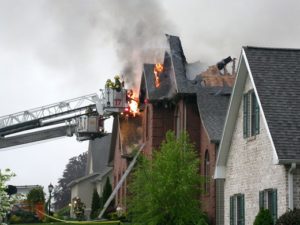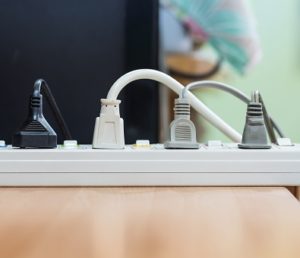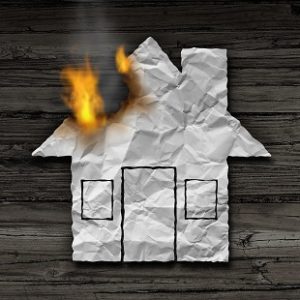 According to the U.S. Fire Administration, in 2014, electrical fires accounted for 6.3 percent of all residential house fires (nearly 24,000 fires), 11 percent of the fires where someone died, and 7 percent of the fires where someone was injured.
According to the U.S. Fire Administration, in 2014, electrical fires accounted for 6.3 percent of all residential house fires (nearly 24,000 fires), 11 percent of the fires where someone died, and 7 percent of the fires where someone was injured.
Your home and family could easily become one of these statistics, and there are probably fire hazards in your home that you haven’t even considered. If you want to avoid having an electrical house fire, keep these seven tips in mind.
Our 7 Tips for Mitigating Electrical Fire Risks
1. Fix or replace damaged electrical cords.
When electrical cords begin to get nicks or cracks in the covering around the wires, then it is time to replace or repair them. Wires should NEVER show on an electrical cord and if they do it should be immediately addressed.
2. Avoid running extension cords under carpets.
It is not a good idea to run extension cords under carpet due to the fact that if it were to become nicked, cracked, or if wires were to become exposed, it would not be visible and could in turn quickly spark a fire. Sure someone could check under the rug every day but that is impractical and would be most likely forgotten. Best practice is to never run an extension cord under a flammable surface.
 3. Add extra circuits or outlets to avoid combining multiple extension cords.
3. Add extra circuits or outlets to avoid combining multiple extension cords.
Extension cords are necessary at times, but it is not a good practice to have extension cords everywhere. A that point you may want to consider having more outlets added to your home for safety purposes and for ease of life.
4. In homes with small children, make sure your home has tamper-resistant (TR) receptacles.
Tamper – resistant receptacles are outlets that do not allow anything but a two prong plug to be inserted into them. This keeps foreign objects out of outlets. Things like pennies, keys, hair pins or anything else a child might try to insert.
5. Avoid overloading outlets.
It is important to remember that outlets CAN be overloaded. As a rule of thumb, remember that only ONE high wattage appliance should be plugged into each receptacle at a time. For example you would not want your dishwasher and your refrigerator to share the same receptacle. This could lead to and blown circuit, or worse a fire.
 6. If you are having general “issues” or “quirks” with your electricity, call an electrician.
6. If you are having general “issues” or “quirks” with your electricity, call an electrician.
If your lights are flickering regularly, or if you if your outlets are warm to the touch, or if you having issues with breakers being thrown, call your electrician.
7. Use bulbs that match the lamp’s recommended wattage.
On every lamp, there is a wattage range or limit. This is not a suggestion, this is a hard and fast rule. Improper light bulbs placed in a socket can cause extreme heat and the possible melting of the light socket.
Want to learn more? Contact us online or at (618) 503-9095 for more fire safety tips or to get pricing for a monitored fire alarm system.

